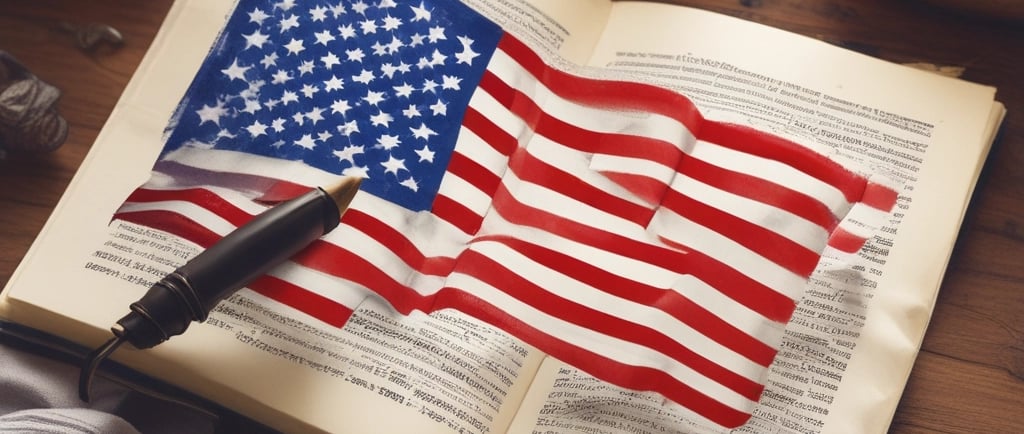Trump's "Birthright Citizenship" Order Blocked Nationwide Again! Did the Supreme Court Just Give a Nod?
7/11/20254 min read


Recently, a Supreme Court ruling led many to believe that the Trump administration's "birthright citizenship" executive order might proceed unimpeded. Last month, the Supreme Court put the brakes on lower court judges' power to issue nationwide injunctions, seemingly clearing the way for the government.
However, just yesterday (Thursday, US time), a new legal battle erupted in federal court, much to the White House's chagrin – a federal judge once again issued a nationwide block against Trump's "birthright citizenship" executive order!
What exactly is going on here? Didn't the Supreme Court already "curb" that power? Don't worry, let's dive deep into this cat-and-mouse game.
Judge Joseph Laplante's "Masterstroke": Cleverly Circumventing the Supreme Court's "Restriction"
This time, the move came from US District Judge Joseph Laplante, an appointee of former President George W. Bush. He had previously expressed some discomfort with issuing "nationwide injunctions." But this time, he employed a "clever" tactic: he granted a request for a "nationwide class action lawsuit" and, based on that, issued a preliminary injunction indefinitely blocking Trump's "Day One" order from being enforced against any baby born after February 20.
📍 The key point here: While the Supreme Court's ruling last month limited the power of lower court judges to independently issue nationwide injunctions, it preserved the ability of plaintiffs to seek a widespread block of the order through "class action lawsuits." And that's precisely what Judge Laplante did!
Judge Laplante stated unequivocally in the hearing: "The preliminary injunction is just not a close call to the court. The deprivation of US citizenship and an abrupt change of policy that was longstanding … that’s irreparable harm." He also emphasized that "US citizenship is the greatest privilege that exists in the world."
In his written order, Judge Laplante even penned: "He has no difficulty concluding that the rapid adoption by executive order, without legislation and the attending national debate, of a new government policy of highly questionable constitutionality that would deny citizenship to many thousands of individuals previously granted citizenship under an indisputably longstanding policy, constitutes irreparable harm."
In short: The Supreme Court opened a window, the plaintiff's legal team seized the opportunity, and the judge was happy to walk through it.
White House Outrage and Accusations of "Rogue Judges"
Predictably, the White House reacted with outrage to the ruling. White House spokesman Harrison Fields issued a statement calling the ruling "an obvious and unlawful attempt to circumvent the Supreme Court’s clear order against universal relief." He even referred to these as actions by "rogue district court judges" and stated that the Trump Administration will be "fighting vigorously" against these attempts to impede the President's policies.
This precisely indicates that the judge's ruling has indeed created substantial trouble for the White House.
The Supreme Court's "Hint" and the Path Forward
It's worth noting that Judge Laplante's decision actually aligns with the spirit of the Supreme Court's "blockbuster ruling" last month.
The Supreme Court's majority opinion, particularly Justice Amy Coney Barrett's writing, explicitly hinted that "class action litigation" is an effective way to block government policies. Even conservative Justice Brett Kavanaugh seemed open to this form of "functional universal injunction," viewing it as a "vitally important responsibility" of the court.
Of course, not all conservative justices shared this view. Justices Samuel Alito and Clarence Thomas warned that "lax enforcement of the requirements" for certifying a class "would create a potentially significant loophole to today’s decision," and urged federal courts to "be vigilant against such potential abuses of these tools."
This means that Laplante's ruling is almost certain to push this issue back before the Supreme Court, forcing the justices to resolve their internal, unsettled split: Is a "functional nationwide injunction" under a class action lawsuit the same kind of "nationwide injunction" they previously restricted?
The Affected Children: From "Uncertainty" to "Protection"
At the heart of this lawsuit are babies born in the United States to parents who are undocumented or only temporarily lawfully present. Trump's executive order, titled "PROTECTING THE MEANING AND VALUE OF AMERICAN CITIZENSHIP," aimed to prevent the federal government from "issuing documents recognizing United States citizenship" to these children.
If the order were allowed to take effect, these children would face "stigma and potential statelessness," loss of their right to vote, serve on federal juries, hold many elected offices, and work in various federal jobs, ineligibility for various federal programs, and potential arrest, detention, and deportation to countries they may have never even seen.
ACLU attorney Cody Wofsy stated that the judge's decision is "a huge victory and will help protect the citizenship of all children born in the United States, as the Constitution intended."
Final Thoughts
This legal battle over "birthright citizenship" is far from over. Judge Laplante's ruling has undoubtedly injected a strong dose of confidence into the forces opposing the Trump administration's policy.
It also demonstrates once again that within the U.S. judicial system, even when the Supreme Court signals a certain direction, lower court judges can often find ways to "cleverly respond" within the legal framework.
In the coming months, we will likely see this case return to the Supreme Court, at which point the justices will have to more definitively define how far the "class action lawsuit" path can extend after they've limited the power of "nationwide injunctions."
